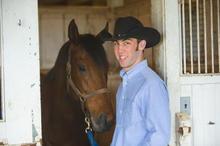Nearly 50 University of Kentucky students will accept their degrees in Equine Science and Management May 9, and itâs likely most are unaware of how new their degree program is and what a momentous occasion its creation was for the college.

UK student Colton Woods working with horses at UK's Maine Chance Farm
A distinct equine undergraduate bachelor of science degree at UK has been in place since the fall of 2007 and has swelled from an initial class of 42 students to 267 students currently in the program, making it the second largest major in the college.
© 2015 by Matt Barton
This spring marks 10 years since the College of Agriculture, Food and Environment launched UK Ag Equine Programs, then called the Equine Initiative.
âThe program is ideally situated in the heart of horse country, and this provides opportunities for researchers, extension agents and students to leave their footprint in the industry at the local, national and international levels,â said Jill Stowe, director of UK Ag Equine Programs.
The college set out to radically change how it served Kentuckyâs signature equine industry when it launched the UK Equine Initiative in 2005 to provide a suite of services appropriate for a land-grant university. At the time, the college housed the Department of Veterinary Scienceâs Gluck Equine Research Center and Veterinary Diagnostic Laboratory and two equine faculty in the Department of Animal and Food Sciences.
While there was research, extension and teaching work already being done in equine in the college, there was no undergraduate stand-alone equine major and few horse-tailored extension programs. There was also no real âfront doorâ for the general public to access UKâs equine expertise.
Much has been accomplished in the last 10 years. The program is distinctive with its strong focus on all three land-grant university missions of teaching, research and extension.
âThanks to a lot of dedicated and passionate faculty, staff and stakeholders, UK Ag Equine Programs has surpassed the original vision. In fact, it is not often that a university program has such rapid success in terms of excellent education, service and relevancy. This program belongs to the horse capital of the world, and we aim to serve the industry for a long time,â said Dean Nancy Cox.
A distinct equine undergraduate bachelor of science degree has been in place since the fall of 2007 and has swelled from an initial class of 42 students to 267 students currently in the program, making it the second largest major in the college. There have been 135 graduates to date. Nearly 70 percent of the current equine majors hail from out-of-state.
The undergraduate program started with tracks in science and management, and has since evolved to four emphasis areas in equine science, business, community and leadership development and forages/pasture management. An internship is a requirement for graduation.
Additionally, seven equine-related clubs and teams are available for students to pursue their equine interests outside the classroom. Those organizations include the Dressage and Eventing Team, Equestrian Team with both hunt seat and western divisions, Horse Racing Club, Polo Team, Research in Equine and Agricultural Disciplines Club, a still fledgling Rodeo Team and the Saddle Seat Team.
In addition to its burgeoning undergraduate program, the College of Agriculture, Food and Environment also offers targeted graduate school opportunities and is home to world-class research and service excellence in equine nutrition, pasture and forages, economics, environmental stewardship and many others.
The Gluck Equine Research Center has a storied history of important equine health research and currently has a research focus in the areas of genetics and genomics, infectious diseases and immunology, musculoskeletal science, parasitology, pharmacology/toxicology and reproductive health.
The vast majority of horses raised in Kentucky use pasture as an important nutrient source, and researchers at UK are developing nutrition and pasture management practices that improve knowledge of optimal feeding programs and production schemes for horses.
Equine researchers at UK have also increased their efforts in understanding the role of nutrition and feeding management on the health, growth and longevity of horses in recent years.
The 2012 Kentucky Equine Survey, a comprehensive statewide survey of all breeds of horses, ponies, donkeys and mulesâthe first such study in Kentucky since 1977âwas conducted between June and October 2012 in cooperation with the U.S. Department of Agriculture and in partnership with several Kentucky industry organizations.
The survey found that Kentucky is home to 242,400 horses with a total economic impact of almost $3 billion. The survey is available online at http://www2.ca.uky.edu/equine/kyequinesurvey.
UK also has a long history of exceptional equine service and outreach.
The Veterinary Diagnostic Laboratory, one of the busiest state diagnostic laboratories in North America with more than 53,000 case submissions each year, serves as sentinel for animal and human health and has the largest equine case load in the world.
The Kentucky 4-H Horse Program is one of the largest in the nation with an enrollment of more than 4,500 youth.
The Horse Pasture Evaluation Program identifies the composition of Kentucky horse pastures, assesses tall fescue toxicity risks and encourages better pasture management practices. To date, the program has completed more than 120 evaluations on over 18,000 total farm acres.
Education for horse owners also occurs through annual field days, Horse College, horse grazing program, HorseQuest and eXtension. Additionally, several publications by experts offer hands-on horse management information.
More about UK Ag Equine Programs can be found at http://www.ca.uky.edu/equine.
UK College of Agriculture, Food and Environment, through its land-grant mission, reaches across the commonwealth with teaching, research and extension to enhance the lives of Kentuckians.
Writer: Holly Wiemers, 859-257-2226
